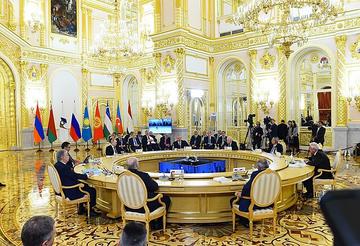In case you missed Alex Cooley at our recent UC Module in Sofia, here’s an article on the topic of his lecture.
After Russia invaded Ukraine in February 2022, many Western analysts and scholars who study post-Soviet countries expected those countries’ governments and publics to express solidarity with Ukraine and denounce Russian attempts to reclaim territory and deny Ukraine’s sovereignty. Following the collapse of the Soviet Union in 1991, the post-Soviet states have sought to consolidate their independence, forging links with the West and other regional players while remaining mindful of the need to manage their relations with Russia. Russian President Vladimir Putin, however, has since 1999 made reestablishing influence over Russia’s “near abroad” a strategic priority in his bid to justify his great-power aspirations.
Putin began his tenure by waging an aggressive military campaign to bring Chechnya back under Moscow’s control. And over the course of the next decade, he intensified his attempts to curb Western influence across the post-Soviet space, opposing the continued presence of U.S. military bases in Central Asia and the so-called color revolutions that brought more Western-friendly governments into power in Georgia, Kyrgyzstan, and Ukraine. The Kremlin justified its 2008 war with Georgia as an effort to protect Russia’s “privileged” sphere of influence in the “near abroad.” Moscow’s strategic priority to blunt Western influence in its region has now culminated in its “special military operation” in Ukraine and a three-year standoff with the West over Ukraine’s future.

Western leaders assumed that a fear of becoming Russia’s next target would encourage post-Soviet countries, particularly those that share borders with Russia, to support Ukraine’s fight to defend its sovereignty. In practice, however, most of the other post-Soviet states have carefully avoided denouncing Russian aggression or adopting a framing of their Soviet past as colonialism. Most have taken a pragmatically neutral stance instead, expressing concern about the conflict while refusing to publicly condemn Moscow, support Kyiv in UN votes, or join the Western sanctions regime against Russia. Indeed, since the war in Ukraine broke out, rather than tilt toward the West, the post-Soviet states have deepened and even forged new connections to their former imperial center. Some increases in Russian trade and investment in Central Asia extended preexisting economic networks and patterns of labor migration, but others—such as the influx of Russian information technology workers into the Caucasus and Central Asia’s facilitation of Russia’s efforts to evade Western sanctions—have been more unexpected.
Crucially, these developments do not merely reflect a fear of Russian retribution. Instead, the resilience of Russia’s influence reflects the diligent work Putin has put in to establish and cultivate formal and informal regional institutions, networks, and partnerships within the former Soviet domain, often in an attempt to create counterweights to Western-backed organizations such as NATO and the European Union. These post-Soviet organizations and initiatives have vastly increased the quantity of people, goods, and even ideas flowing between Russia and its post-Soviet neighbors and created new mechanisms for alliances and common causes. They have also allowed Moscow to use regional economic agreements and supply chains to evade Western sanctions. This means that it was never going to be as easy as many Western observers anticipated to isolate Russia or to convince the post-Soviet states that they would be better off extricating themselves from Moscow’s orbit. Russia will continue to cultivate its sphere of influence in the post-Soviet space. The West would do better to prioritize finding ways to selectively engage with each of these states that go beyond simply offering membership in Euro-Atlantic institutions—offers that require slow and difficult processes and that may not actually end in acceptance.
Read the rest of the article at Foreign Affairs Website